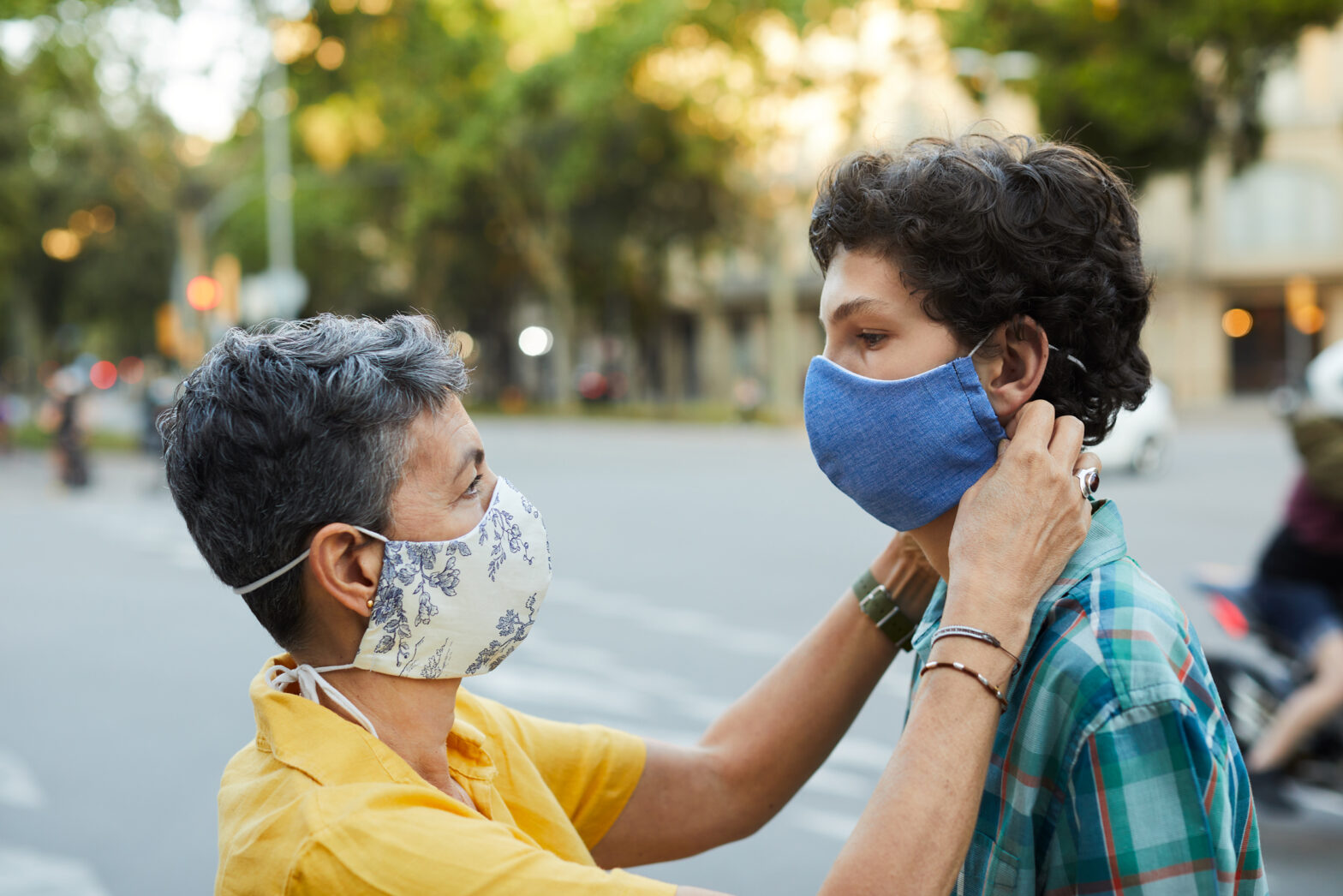Maskne is an umbrella word that refers to a variety of skin disorders that may develop as a result of covering one’s face with face masks or other covering.
Acne is one of the possible side effects. Your pores get blocked with oil, dead skin cells, and debris, which leads to the development of acne. It is possible for it to result in zits, whiteheads, or blackheads. It is more likely to occur if you have a history of acne, but anybody is at risk of developing it. It seems to be the most frequent occurrence People who are wearing surgical face masks and other forms of respirators are considered to be Trusted Sources.
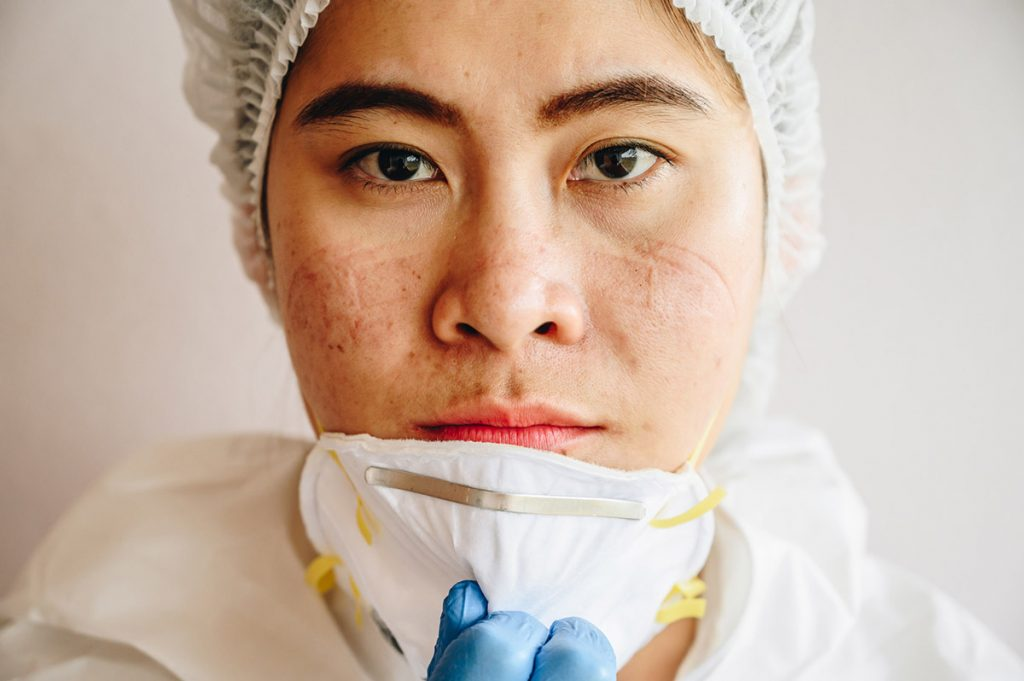
Rosacea
Wearing the best face masks when you have rosacea might make your symptoms worsen. This may result in acne and a reddening of the skin.
Contact dermatitis
If you have an allergy or sensitivity to the material that your face masks are made of, you may get contact dermatitis. It may cause a rash that is red and itchy, in addition to blistering and irritation. It is the most typical kind of mask response, and it often affects the cheeks as well as the bridge of the nose. Those who wear face masks for six hours or more straight without taking a break, in addition to those who already have a weakened skin barrier, are at a greater risk. The symptoms might vary from skin regions that are dry and scaly to skin ulcers.
Atopic eczema
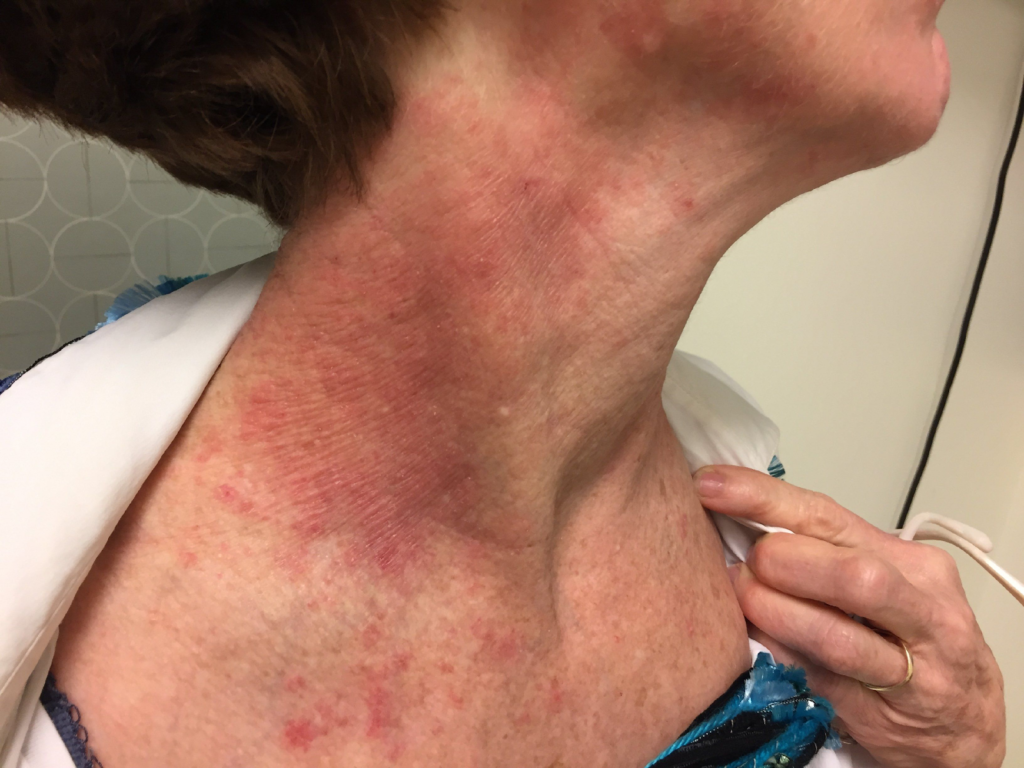
Because of the irritating impact that wearing face masks might have on those whose skin is sensitive due to eczema, skin symptoms can arise or worsen in these individuals. These symptoms are also known as atopic dermatitis.
Dermatitis of the face and neck
This is a syndrome in which a person develops tiny pimples around their lips and eyes. It is possible for this to occur for no apparent reason, when wearing face masks, after applying cosmetics or corticosteroid creams, or even when there is no mask being worn at all.
Folliculitis
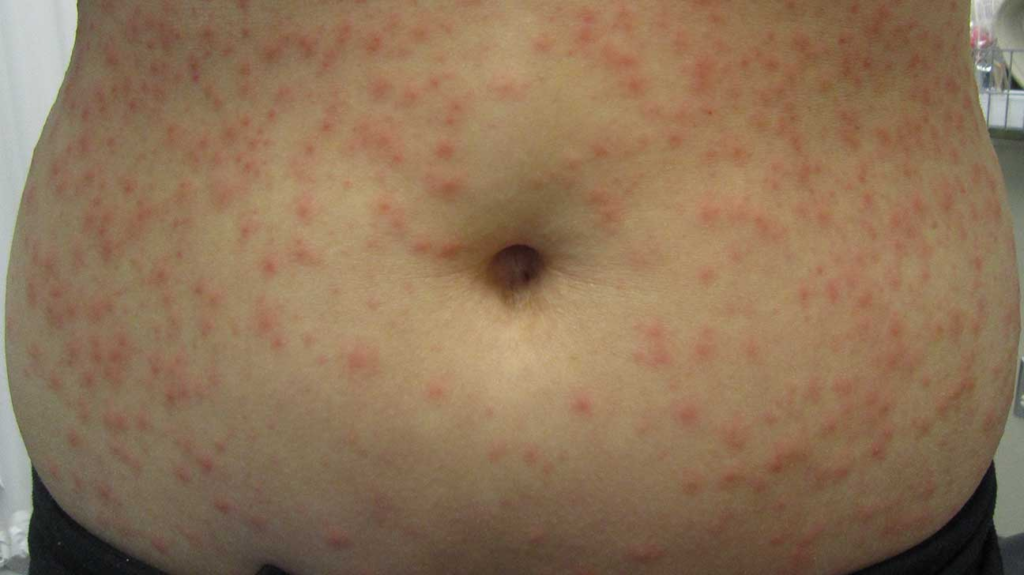
Acne-like pimples on the skin might be caused by a condition known as folliculitis, which is an inflammation of the hair follicles. Itchiness and discomfort are two more potential side effects.
Urticaria
Wheels, also known as hives, are a skin condition that may be brought on by the downward pressure exerted by some kinds of face masks or by contact with allergens like latex in those who are prone to the condition. Urticaria due to pressure might manifest either immediately or within twenty-four hours Trusted Source. Urticaria caused by an allergic reaction often manifests all at once and goes away within twenty-four hours after the offending agent has been eliminated. You can also read about What to do to prevent acne from wearing face masks by visiting http://qualitylifefit.com/what-to-do-to-prevent-acne-from-wearing-face-masks/
Seborrhoeic eczema
This kind of dermatitis is characterized by the development of greasy yellow scales, most often on the scalp, forehead, and eyebrows, as well as in the folds that surround the nose and lips.
It’s possible that if you already have one of these disorders, you’re more likely to develop maskne, although routinely wearing face masks may also cause symptoms to appear for the first time.
Because of the material that is used and the way that the protective equipment is fitted, some face masks and face coverings, such as those that are used in a hospital environment, might produce skin changes that are more severe. You can also read more about Seborrheic Dermatitis by clicking here.
Why does it happen?
Because maskne may refer to a wide variety of skin diseases, the precise reason for your symptoms might differ from person to person.
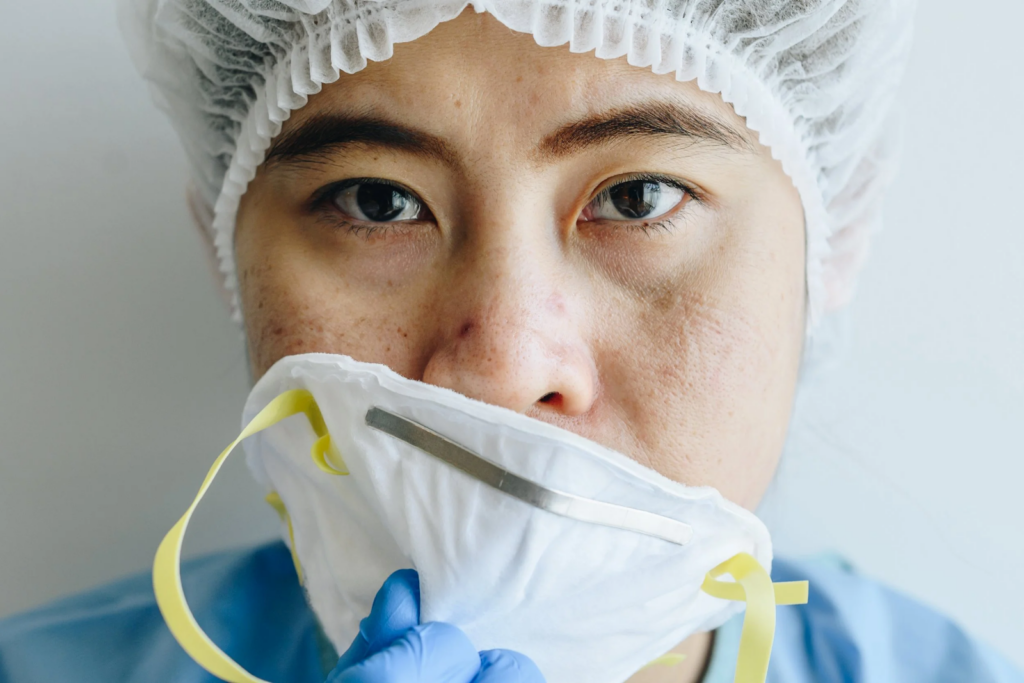
In the vast majority of situations, acne is brought on by blocked pores. On top of the dead skin cells and oil that are already present on your skin are microorganisms. However, these compounds have the potential to accumulate more and obstruct your pores if you wear face masks.
In addition, the act of breathing and sweating while wearing a mask causes humidity to get trapped, which may make acne more likely.
Friction is a further factor that may have contributed. When the fabric of a face covering is rubbed against your skin, it might cause chafing and discomfort.
You can also have a sensitivity to or an allergy to the substance that your face covering is made of. Some masks have already been treated with chemicals, while others may be rather irritating to the skin. In a similar vein, washing a mask in a detergent that has a perfumed aroma might cause discomfort.
A guide to the treatment of acne
Even if you already have maskne, it is imperative that you continue to wear a face mask. Protecting yourself and the people around you against COVID-19 infection by keeping your mouth and nose covered is one of the most effective methods to do so.
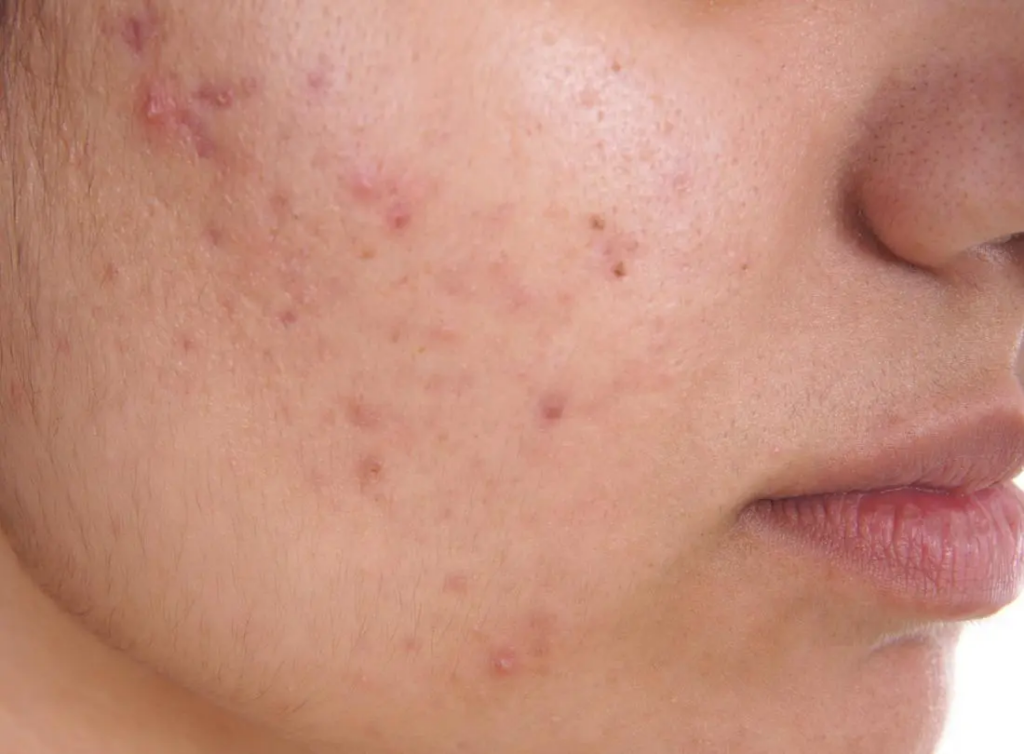
Maskne may be prevented in part by wearing an appropriate mask, but there are also treatments available in the case that symptoms do appear.
Let’s take a more in-depth look, shall we?
You should wash your face often
Maintaining a consistent regimen for your skincare products can help you maintain your skin healthy throughout the epidemic.
This involves cleaning your face once in the morning, once in the evening before going to bed, and again if you have been sweating or have been wearing a mask.
When you wash your face, use water that is lukewarm, not hot. Make sure that you use a fresh towel to pat your skin dry. You should try to avoid touching your skin since doing so might lead to inflammation. Make use of straightforward soaps and cleansers.
Make sure to use a mild cleaner
A mild cleanser is able to assist in the removal of microorganisms, as well as excess oil and perspiration. You should steer clear of cleaners that include alcohol or scent. These components have the potential to aggravate your symptoms and make it more difficult for them to recover.
If your acne is more severe, you should look for a medicated cleanser that contains either salicylic acid or benzoyl peroxide.
If you have sensitive skin, you should see your primary care physician or a dermatologist about the sort of medicated cleanser that would work best for your skin.
Use a non-comedogenic moisturizer
Applying a moisturizer after washing your face can help your skin retain its natural moisture for longer. Utilize a product that is non-comedogenic, as this will help prevent your pores from being clogged.
Cortisone cream and a moisturizer containing ceramides should be used
If your maskne primarily consists of irritated and raw skin, you may want to try applying mild cortisone cream to the area in addition to a moisturizer that contains ceramides. This is especially the case if your maskne is more severe. This may assist protect your skin as well as ease itching and irritation that your skin may be experiencing.
Take a break from makeup
While you are treating your acne, you should forego wearing cosmetics. Makeup such as foundation, concealer, and blush may cause your pores to get clogged and slow down the healing process.
